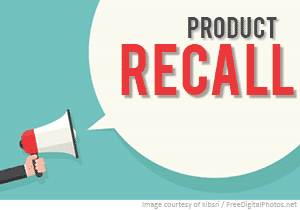
You have done all that you can. You have been diligent in your R&D, engineering, testing, manufacturing and quality control. Sales and Marketing are excited and ready. You have vetted instruction manuals and labels. You have even involved Legal. Your product enters the marketplace with confidence and you see growth, brand recognition and, of course, increased revenue.
The product is a success, all you hoped for has occurred. But then an issue arises. It starts as a single complaint, and you believe it to be an isolated incident. Then another complaint and the numbers continue to grow. Inquiries and notices arrive from consumer groups, lawyers, and now the press is involved. Government regulators are the next to inquire. Confidence turns to angst as a “product recall” is now ordered. With the near-constant barrage of internal and external inquiries to address, you feel some relief with the knowledge that you have the best broker, insurance policies, crisis management plan and claims management team available. But do you?
You may have a commercial general liability policy, and even a product liability policy, but very importantly, product recall is generally excluded from both forms. Specific policy wording varies, but the meaning and intent are the same; the policy excludes “…the costs of recalling, removing, repairing, reconditioning or replacing any product or any of its parts.” Are you certain of your coverage? Product recall coverage is available either as an extension of your product liability policy, or as a standalone policy. Consult and verify with your agent or broker that you have the appropriate coverage for your risk.
It is not overstatement to say that a product recall can be a business-ending event. Associated costs can be enormous, well beyond the apparent expenses, e.g. shipping, refunds, etc. Claims may arise for:
- Customers’ business interruption losses
- Claims for product removal and replacement
- Customers’ claims for lost profits and opportunities, and their loss of brand recognition
Additional concerns involving the actual recall process include:
- Additional staffing to cover the recall program
- Legal costs and expenses to respond to litigation and/or regulatory agencies
- Specialized communication expenses to respond to media inquiries
- Consultants to assist in brand protection and restoration
And there is your time. Product recall events require senior staff involvement, attention to detail, planning, implementing and monitoring the process. Distractions caused by the ongoing process impair other company operations as even uninvolved staff is affected. Internal communication advising employees of the plan and process will maintain confidence in management and the company and are important to stability and long-term success.
The design and execution of a crisis management plan is critical to the continued present and future success of the company:
- Design crisis management processes
- Notification and response
- Team resources structure and response
- Plan maintenance timelines documents responsibilities
- Communication and coordination
- Open and action status updates and tracking
- Deactivation process
- Training and executing the crisis management plan
Bottom line: be certain of your coverage. With any new product or initiative, involve insurance professionals early in the discussion. Your agent or broker can assist in available coverage options, and Sedgwick can assist in discussing associated risks. Our claims team, which includes legal and claims specialists, can assist in a review of policy wording or advise of similar risks and real-life situations they have experienced. Sedgwick also can team up with a client to develop a sound crisis management plan in the event a recall is required, including partnering with a client’s public relations team to assist in reputation management response. This information can be invaluable in your assessment and planning process, and potentially save you from an uninsured loss.
Mario Rodriquez, Director National Technical Compliance